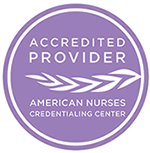Condition 5: Community Engagement – Strengthening Partnerships and Collective Impact
Webinar Details
This session explores how academic nursing programs can establish and sustain meaningful partnerships with communities to advance health, enhance education, and prepare practice-ready graduates. Grounded in the AACN Ecosystem of Excellence in Academic Nursing, the session focuses on the Community Engagement Condition within the Operational Core, emphasizing that authentic, reciprocal relationships are essential to academic excellence and social impact.
Participants will examine how community-engaged partnerships enrich learning, support workforce development, and strengthen alignment between academic missions and public needs. The session highlights strategies for designing community-based experiences that build trust, promote shared learning, and address real-world health priorities—particularly those affecting under-resourced or historically underserved populations.
Attention will also be given to integrating technology, global perspectives, and accountability measures that ensure long-term impact and mutual benefit. By linking community partnerships to the Humanistic Conditions of connection, value, and purpose—and to AACN’s Access, Connection, and Engagement (ACE) vision—this session demonstrates how meaningful engagement bridges education, practice, and policy to create enduring pathways for excellence and collective well-being.
Learning Outcomes
After participating in this webinar, attendees will be able to:
- Explain the value of sustained, reciprocal community engagement in preparing students, supporting faculty and staff, and advancing institutional relevance.
- Evaluate how community partnerships influence student learning, clinical competence, and understanding of health systems and population needs.
- Apply strategies to design, evaluate, and strengthen community-based experiences that promote mutual benefit, trust, and long-term connection between nursing programs and the populations they serve.
- Describe how the Community Engagement Condition within the Operational Core supports the ACE vision by connecting academic nursing with communities to achieve shared goals for education, health, and workforce readiness.
About the Ecosystem
The AACN Ecosystem of Excellence in Academic Nursing is a comprehensive, evidence-informed framework that aligns mission, people, and systems to create environments where all students, staff, and faculty can thrive.
At its foundation are the Humanistic Conditions—Healthy, Psychologically Safe, Connected, Supported, Valued, and Prepared—that enable individuals to achieve their best. These are integrated through the Ecosystem’s three Cores:
- Human Core, which centers on the Humanistic Conditions that foster well-being and engagement.
- Operational Core, which aligns systems and strategies through five Institutional Conditions: Infrastructure and Capacity, Climate and Intergroup Relations, Education and Scholarship, Access and Success, and Community Engagement.
- Institutional Core, which grounds excellence in shared culture through five Cultural Conditions: Mission, Vision, Values, Traditions, and Norms.
The Operational Core is supported by a digital Ecosystem Toolkit that translates the framework into actionable strategies and measurable outcomes, including:
- Strategies that strengthen policies, practices, and structures
- Scenarios illustrating real-world challenges and solutions—each intentionally linked to the Humanistic Conditions of the Ecosystem and aligned with relevant AACN Essentials
- Reflection questions that promote dialogue, planning, and innovation
- Dashboards and planning tools to monitor progress and outcomes
- Curated supporting literature that provides evidence and context for implementation
Note: Recording of the webinar will be available soon after the webinar airs. Visit AACN's On-Demand Webinars to watch.
Speakers
 Wanda Thruston, DNP, APRN, RN
Wanda Thruston, DNP, APRN, RN
Director of Access and Engagement
American Association of Colleges of Nursing
Dr. Wanda Thruston, Director of Access and Engagement at AACN, is a national and international leader in academic nursing and advancing fair and just access to health and well-being for all, with expertise in institutional transformation, leadership development, and systems-level strategy. A Robert Wood Johnson Foundation Clinical Scholar Fellow, she brings decades of experience in clinical practice with under-resourced populations, health policy, and academic leadership.
At AACN, Dr. Thruston led the development and implementation of the Ecosystem of Excellence in Academic Nursing, a strategic framework designed to enhance institutional effectiveness and promote the success of students, staff, and faculty. She provides technical assistance, training, and consultation to HRSA-funded nursing schools and AACN member institutions—supporting strategies to expand access, strengthen student achievement, improve the institutional climate, and build academic environments where all individuals feel supported and prepared to succeed.
Previously, she served as Special Assistant to the Dean at Indiana University School of Nursing, where she led the development of the Diversity Strategic Plan and co-created a university-wide pathway for DEI faculty promotion. She also led a large-scale assessment of health and well-being for Indiana’s second-largest K–12 district to inform fair and effective resource allocation that meets the needs of all students. Dr. Thruston is committed to advancing environments where students, staff, and faculty thrive.
Pricing and CE Credit
This webinar is free to deans, faculty, staff and students from AACN member schools of nursing. All non-member audiences will be required to pay a $59 webinar fee.
Continuing Nursing Education
One nursing continuing professional development (NCPD) credit is associated with this webinar; attendees must be present for the entire webinar and complete the evaluation to receive a certificate of completion.

The American Association of Colleges of Nursing is accredited as a provider of nursing continuing professional development by the American Nurses Credentialing Center’s Commission on Accreditation.
